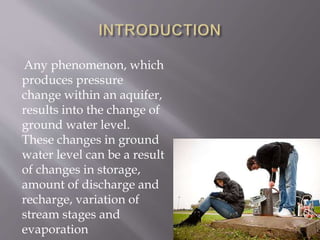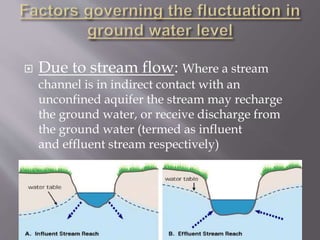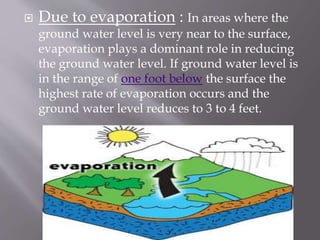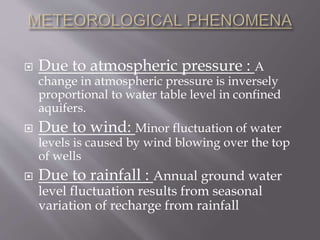GROUNDWATER LEVEL FLUCTUATION
- 1. GROUNDWATER LEVEL FLUCTUATION SUBMITTED BY HARIKRISHNAN S DEPT. OF APPLIED GEOLOGY PERIYAR UNIVERSITY SALEM , INDIA
- 2. Any phenomenon, which produces pressure change within an aquifer, results into the change of ground water level. These changes in ground water level can be a result of changes in storage, amount of discharge and recharge, variation of stream stages and evaporation
- 3. TIME VARIATION OF GROUNDWATER LEVEL ’é© Secular variation : These are variations in ground water level extending over a period of years. ’é© Seasonal variation: These results from influence such as recharge from rainfall and irrigation and discharge by pumping which follow well defined seasonal cycles ’é© Diurnal variation : These variations are within a day due to tidal effect
- 4. ’é© Due to stream flow: Where a stream channel is in indirect contact with an unconfined aquifer the stream may recharge the ground water, or receive discharge from the ground water (termed as influent and effluent stream respectively)
- 5. ’é© Due to evaporation : In areas where the ground water level is very near to the surface, evaporation plays a dominant role in reducing the ground water level. If ground water level is in the range of one foot below the surface the highest rate of evaporation occurs and the ground water level reduces to 3 to 4 feet.
- 6. ’é© Due to transpiration : where the root zones of plants are directly in contact with saturated water zone. This also results in reducing the ground water level.
- 7. ’é© Due to atmospheric pressure : A change in atmospheric pressure is inversely proportional to water table level in confined aquifers. ’é© Due to wind: Minor fluctuation of water levels is caused by wind blowing over the top of wells ’é© Due to rainfall : Annual ground water level fluctuation results from seasonal variation of recharge from rainfall
- 8. ’é© Due to ocean tides : In coastal aquifers in contact with the ocean fluctuation of ground water level occurs in response to tides ’é© Due to Earth tides: Regular semidiurnal fluctuation occurring in small magnitude located a great distance from oceans has been attributed to earth tides ’é© Due to external load : The elastic properties of an aquifer (confined) result in changes in hydrostatic pressure when changes in loading occur.
- 9. ’é© Due to Earthquakes: Observations reveals that earthquakes have a variety of effects on ground water. Other factors that are effecting the groundwater level ’é© Urbanization ’é© Volcanic eruption ’é© External roads ’é© Land subsidence ’é© Continental drift ’é© EtcŌĆ”ŌĆ”ŌĆ”ŌĆ”ŌĆ”
- 10. ’é© https://shodhganga.inflibnet.ac.in/bitstream/ 10603/25955/14/14_chapter4.pdf ’é© https://www.sciencedirect.com/science/articl e/pii/S2352801X17301765 ’é© http://drsksingh.tripod.com/gwlevel.html










